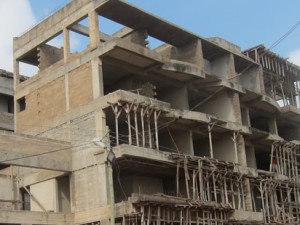State of construction industry is threat to government – Senior Economist
 Mr Habibu Adam, a Senior Economist on Thursday identified the greatest threat to the government as the state of the construction industry inherited from the previous administration which was nearly collapsed.
Mr Habibu Adam, a Senior Economist on Thursday identified the greatest threat to the government as the state of the construction industry inherited from the previous administration which was nearly collapsed.
“Monies owed contractors are causing a lot of pains to them, their banks as well as their suppliers. A lot of projects have grounded to a halt because of unpaid monies owed to the contractors, this has contributed to the liquidity crises in the country.
“It will be in the interest of government to raise Bonds to clear the arrears before June, 2019.
“Beyond June into the raining season, a lot of the projects would have been delayed and will not be commissioned on scheduled before 2020 elections.
A quick action is required from government in settling the debts of the contractors,” Mr Adam told the Ghana News Agency in an interview in Accra.
Mr Adam who is a Senior Economist at the Office of the Senior Minister said the World Bank estimated that on average, Ghana would require about $1.5 billion investments in infrastructural projects for the next ten years to close the infrastructural gap.
“This is beyond what government could provide as a result of huge interest rates, servicing which has exceeded capital expenditure over the last five years. Despite these constraints, government is committing an extra $1 billion to the development of the new railway network.
“$500 million will be applied to the development of the Western line, $500 million will be applied to the first phase of the Kumasi to Paga section of the national network. Tema-Ouagadougou railway line is also progressing steadily,” Mr Adam revealed.
He explained that Ghana and Japan had initiated discussions towards the establishment of a metro rail transport system in Accra.
“In 2018, rail services from Takoradi to Tarkwa was restored for the first time in 11 years. The Accra-Tema railway service has also started running on the refurbished line. Accra-Nsawam to be followed soon,” he said.
He said Government would launch GH¢1 billion Housing Fund that would target low-income earners.
The Senior Economist said $185 million was secured for the construction of 12 landing sites and two fishing harbours in some selected fishing communities in the country.
Mr Adam said the Ghana Integrated Aluminium Development Corporation has been set up for the development of our integrated aluminium industry; “the same model is being pursued for the development of the iron ore deposits and manganese deposits”.
He said about 1,200,000 registered and verified addresses through the National Digital Addressing System and is still progressing. The process is continuing and is expected to hit a target of 4,000,000 addresses by the end of the year.
He said the Economic Management Team (EMT) also organised stakeholder’s sensitisation forum for Ghana’s reforms for ease of Doing Business.
He said many state institutions including; Registrar General’s Department, the Judiciary Service, Ministry of Local Government and Rural Development, Ghana Export Promotion Authority (GEPA), Ghana Revenue Authority (GRA) among others demonstrated how far they had digitised their services.
On why Ghanaians were not feeling the good economic statistics in their pockets, Mr Adam explained that upon assumption of office, the government realised that there was no fiscal space within which to implement its ambitious policies.
In addition, government income streams such as those from the road fund were also mortgaged to one of the foreign banks.
This, he said meant all the road tolls and DVLA charges and other deduction comprising the road fund could not be available to government.
Mr Adam said at the same time, government was committed to over GH¢17 billion liability at the Ministry of Roads and Highways when the budget for 2016 was GH¢625 million; GH¢5.5 billion to the Cocoa roads sector when the budget was GH¢1.5 billion in 2016.
The figure was pegged at $2.4 billion energy sector debts, GH¢1.2 billion NHIS debt in claims and supplies, GETFUND was in debt of about GH¢838 million and District Assembly Common Fund Secretariat was also in arrears of close to GH¢900 million as end of 2016, GH¢3.2 billion of pension contributions for public servants were unpaid for 72 months.
Mr Adam explained that many MDAs were in similar situations; stressing how could anyone expect the government to spend on infrastructure and create jobs, when most of our banks were collapsing because of unpaid loans by both MDAs and government contractors and suppliers?
He said the best option for government was not to cancel some of the contracts, re-negotiate some of the contracts and limit new contracts to critical needs and try to settle most of the debts.
Mr Adam said this took nearly two years to settle substantial part of the debt at the expense of Ghanaians comfort; “It is now time for Ghanaians to feel the economy in their pockets”.
Source: GNA
